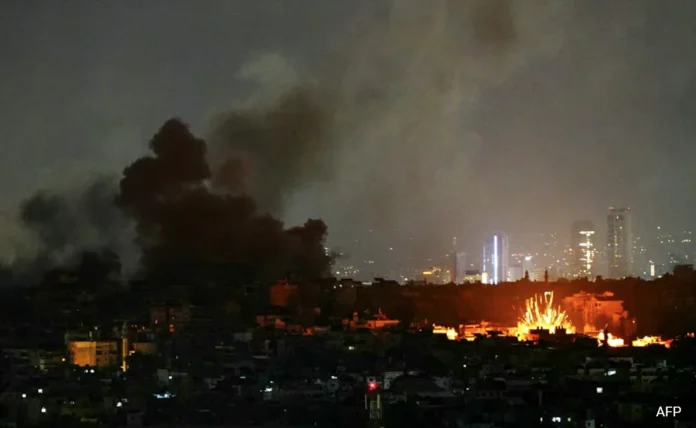In a major development in the Middle-East, Israel and Lebanon have officially agreed to a ceasefire, putting a temporary halt to the months-long conflict with Hezbollah. The ceasefire, negotiated with the mediation of the United States and France, comes into effect at midnight on November 27, 2024.
Netanyahu’s Firm Warning Despite Agreement
Israeli Prime Minister Benjamin Netanyahu, addressing the nation following the Security Cabinet’s approval of the ceasefire, emphasized the conditional nature of the agreement. “The length of the ceasefire depends on what happens in Lebanon,” Netanyahu declared. “We will enforce the agreement and respond forcefully to any violation. The war will not end until we realize all its goals, including obliterating Hamas, bringing back our hostages, and ensuring Gaza no longer poses a threat to Israel.”
Netanyahu also cited three strategic reasons for agreeing to the ceasefire:
- Focus On The Iranian Threat: Without elaborating, Netanyahu indicated that Iran remains a top concern for Israel.
- Replenishing Military Resources: Netanyahu acknowledged delays in weapons and munitions deliveries but assured that advanced weaponry would soon bolster Israel’s strike capabilities.
- Separating Fronts To Isolate Hamas: The Prime Minister highlighted the importance of neutralizing Hezbollah’s involvement, thereby weakening Hamas, which has been heavily dependent on Hezbollah’s support.
Key Terms Of The Ceasefire Agreement
The agreement outlines several critical commitments between Israel and Lebanon:
- Halt In Hostilities: Hezbollah and other militant groups in Lebanon will cease all offensive operations against Israel, and Israel will reciprocate by refraining from military strikes in Lebanon.
- UN Resolution Acknowledgment: Both parties reaffirm the importance of United Nations Security Council Resolution 1701, which seeks to prevent hostilities along the Israel-Lebanon border.
- Lebanese Army Control: Only official Lebanese security forces will be allowed to operate in southern Lebanon, with all unauthorized military infrastructure dismantled.
- Arms Regulation: Lebanon will oversee and control any weapons production and sales, dismantling unlicensed facilities and confiscating non-compliant arms.
- Supervisory Committee: A joint committee, alongside the United Nations Interim Force in Lebanon (UNIFIL), will monitor the implementation of the agreement.
- Gradual Israeli Withdrawal: Israel will withdraw from areas south of the Blue Line within 60 days, with Lebanon deploying its forces along all border regions.
- US Mediation For Border Issues: The United States will facilitate further indirect negotiations to settle unresolved border disputes.
Background Of The Conflict
The months-long conflict between Israel and Hezbollah has caused significant destruction and loss of life on both sides. The hostilities began escalating over a year ago when Hezbollah launched a series of rocket attacks on Israel, prompting a forceful response.
Hezbollah, a Lebanon-based, Iran-backed militant group, has been a long-standing ally of Hamas. The conflict intensified after Hamas launched a surprise attack on Israel in October 2023, breaching the Gaza border and taking hostages.
The war in Gaza led to tens of thousands of deaths and large-scale devastation, further complicating the already volatile situation in the Middle-East.
Role Of International Mediators
The ceasefire agreement has been brokered with significant diplomatic efforts by the United States and France. US President Joe Biden and French President Emmanuel Macron are expected to make official announcements soon, highlighting their roles in facilitating the peace process.
US Secretary of State Antony Blinken has been closely coordinating with Israeli and Lebanese officials, emphasizing the need for de-escalation and stability in the region.

Challenges Ahead
While the ceasefire offers a glimmer of hope, challenges remain. Netanyahu’s warning of swift retaliation in case of a violation underscores the fragility of the agreement. Hezbollah’s willingness to adhere to the terms will be closely watched, as any breach could reignite hostilities.
The involvement of international mediators and oversight committees provides a mechanism for conflict resolution, but the deeply entrenched hostilities and regional complexities make lasting peace a daunting goal.
Global Reactions
The agreement has garnered cautious optimism from the international community. Analysts have praised the diplomatic efforts while warning of potential pitfalls. “This is a step forward, but the real test lies in the implementation and adherence to the terms,” said a Middle-East expert.
The ceasefire marks a pivotal moment in the ongoing conflict, offering a temporary reprieve and a potential pathway to de-escalation. However, the road to lasting peace in the Middle-East remains fraught with challenges, requiring sustained diplomatic engagement and mutual accountability.



